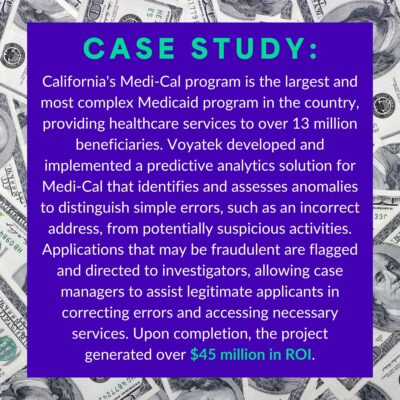Beyond Fraud, Waste, and Abuse: Creating efficiencies that improve agency operations and benefit constituents
Beyond Fraud, Waste, and Abuse:
Creating efficiencies that improve agency operations and benefit constituents
In the ongoing quest for “efficiency” within state government, the conversation often centers around trimming budgets, streamlining processes, and doing more with less. But what if our focus on efficiency is too narrow?
When we talk about fighting fraud, waste, and abuse, the narrative tends to revolve around saving money and tightening controls. However, every dollar lost to mismanagement isn’t just a line item on a spreadsheet—it’s an opportunity lost for individuals who rely on public services and community programs.
It’s time to reframe efficiency not just as a financial imperative, but as a path to delivering meaningful value for constituents. By connecting anti-fraud and anti-waste efforts directly to everyday experiences like safer streets, better schools, and more reliable services, we can show how cutting inefficiency isn’t just about cost savings. Ultimately, it’s about building trust, expanding opportunity, and making systems work better for everyone. Let’s explore strategies for creating efficiencies that improve agency operations and benefit constituents.
Make compliance easier
We need to make it easier to do business with the government. When a mother wants to apply for the WIC program or a college admissions office needs to document that it’s complying with a new regulation, all parties benefit when exchanging the required information is a straightforward process.
Of course, the government has an interest in verifying and managing that information—making sure that the mother actually qualifies for WIC and validating that the admissions office is using financial aid dollars appropriately. Unfortunately, these efforts to stop fraud, or even implement basic case management processes, can cause friction for users just trying to use the system honestly.
Stage agencies must invest in modern, scalable solutions that enhance efficiency, streamline the constituent experience, and simplify compliance with changing regulations. In doing so, they’ll reduce the administrative burden on both government staff and residents.
Create self-service options that meet your constituents’ specific needs
We often think of replacing clunky legacy processes with digital services as surefire way to increase efficiency—removing the need for customer service interactions and allowing residents to apply for services online should speed up transactions. But simply creating digital access points doesn’t mean they’ll be used. In fact, a recent survey found that only 23% of US respondents regularly interact with government through digital channels. Unlike “Field of Dreams”, if you built it, they won’t necessarily come.
For example, one of Voyatek’s WIC clients was struggling to increase adoption of its mobile app, which was designed to help WIC participants register for the program, scan barcodes while shopping to verify coverage, and interact with customer service via chat. However, we discovered that many WIC participants couldn’t access the app on their mobile phones for a variety of reasons (e.g., outdated operating systems, storage capacity). To address this, we developed a mobile-friendly, web-based Client Portal that could be easily accessed from any device. As a result, 1,860 new families who have never been on WIC before have registered and attended their initial certification appointment.
Invest in Behavioral and Customer Experience Analytics
A robust customer experience (CX) program can answer why constituents aren’t using a digital service and provide a deeper understanding of how a program is executing against its mission. CX analytics looks at many types of customer feedback to understand the good, bad, and ugly — and adjust accordingly. With these insights, agencies can then use behavioral analytics to test which treatments or “nudges” lead to specific user actions.
A deeper understanding of the customer journey has been particularly beneficial for Voyatek’s tax and revenue clients. Departments of Revenue (DORs) are, of course, always in pursuit of increasing tax compliance and bringing in more revenue without increasing costs. By investing in CX and behavioral analytics, our clients are able to better identify which noncompliant taxpayers are more likely to “self-cure” (i.e., come into compliance after being notified and provided clear instructions on how do to so), versus which will require more robust interventions. This allows agencies to better allocate resources towards the cases that truly need attention.
Voyatek has also assisted the IRS in improving taxpayer communications and engagement by utilizing behavioral analytics to encourage desired behaviors, such as using online self-service channels, while discouraging undesired behaviors, like calling customer service centers. For instance, we’ve used principles from psychology, neuroscience, and behavioral economics to redesign hundreds of taxpayer notices, resulting in an 80% increase in the use of online self-service channels
True efficiency in government isn’t just about preventing fraud or cutting costs; it’s about making every interaction meaningful for the people who depend on public services. As state agencies modernize operations, making compliance seamless, building thoughtful self-service options, and leveraging customer experience analytics, they go beyond “doing more with less.” These smart, people-centered investments help agencies become more resilient, more trusted, and more effective. In the end, when efficiency is designed with constituents in mind, everyone benefits—from the frontline employee to the family seeking vital support—building stronger communities in the process.
-Bobette Nelli, Senior Manager, Voyatek


